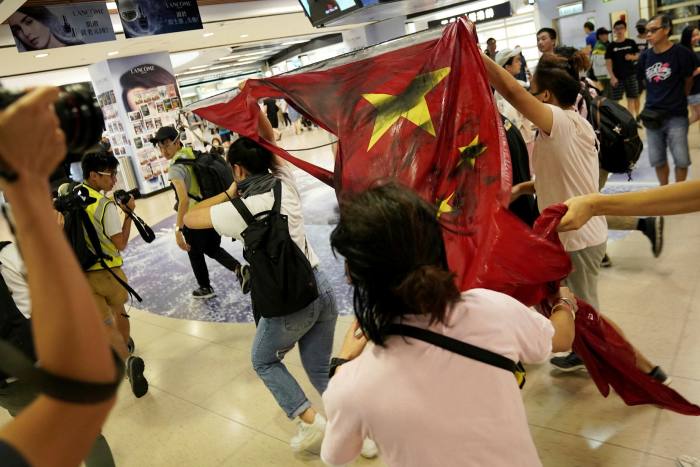China has said it will impose national security legislation on Hong Kong, reigniting street protests and sparking international condemnation.
More demonstrations were expected on Wednesday, with lawmakers in the city set to debate a separate bill that would make it a criminal offence to insult the Chinese national anthem.
If enacted, the mainland national security legislation will mark the first time that a Chinese law carrying criminal penalties has been introduced into Hong Kong’s legal code, bypassing the territory’s legislature and public consultation processes. Legal scholars and the Hong Kong Bar Association, the top legal body for the territory’s barristers, say the proposal undermines the rule of law in the territory and violates Hong Kong’s mini-constitution.
What is the proposed law?
China’s legislature has issued a draft decision under which it will write a new national security law for Hong Kong that would prohibit “splittism, subversion, terrorism, any behaviour that gravely threatens national security and foreign interference”.
These terms have not been defined but the proposed law would probably be similar to China’s national security legislation, said Johannes Chan, a former law school dean at the University of Hong Kong. “China’s national security law basically covers whatever [Beijing] wants it to cover. The last thing we want is for mainland China’s criminal law to apply to Hong Kong.”

Does Beijing have the authority to impose the law?
When the UK handed Hong Kong over to China in 1997, Beijing introduced a framework known as “one country, two systems” that granted the Asian financial hub a high degree of autonomy for 50 years.
According to Hong Kong’s mini-constitution, the Basic Law, the territory is required to implement its own national security law to replace colonial legislation that was revoked during the handover. Tung Chee-hwa, Hong Kong’s first chief executive, tried to pass this legislation in 2003 but withdrew it after it triggered mass protests. His three successors never attempted to reintroduce similar laws, despite warnings from Beijing that Hong Kong was obliged to do so.
Beijing said it could not wait any longer for Hong Kong to introduce its own national security law, leading to its announcement last week. But Beijing did not have the authority to impose such a law, lawyers said. Beijing’s proposal violates the Basic Law, which states that Hong Kong shall enact anti-subversion laws “on its own”, according to the Hong Kong Bar Association, adding that there are “a number of worrying and problematic features” about the proposed law.

Why is the law contentious?
“This is the nuclear option: Beijing’s ultimate power to impose whatever it wants on Hong Kong, outside and above Hong Kong’s constitutional, political and legal structure,” said Antony Dapiran, a lawyer who has written two books on Hong Kong’s protest culture.
Hong Kong’s rule of law, which includes an independent judiciary, is one of the crucial factors that distinguishes it from mainland China. But the draft law instructs the territory’s judiciary to “effectively prevent, stop and punish acts endangering national security”. This suggests Hong Kong’s judges will be instructed by the Chinese Communist party to act in certain ways, undermining the city’s rule of law.
While China’s state security agencies have long operated undercover in Hong Kong, the proposed bill allows China’s secret police to have a formal presence in the territory. Legal scholars say this also violates the Basic Law.
When will the law be implemented?
China’s legislature, known as the National People’s Congress, is expected to vote on and pass the draft decision on Thursday. An NPC committee will then draft and adopt the full text of the law, which may be passed as soon as June but more likely in August. The Hong Kong government will publish the legislation in a government gazette, which may only take one or two days, before it becomes law in the territory.
“The whole thing will probably be conducted behind closed doors and by the time we see it, it will have already been adopted,” said Mr Chan.

What does the law cover?
Much remains unknown about the law, including the definitions of “splittism, subversion, terrorism and foreign interference”. The scope of China’s national security law extends beyond ordinary criminal activities to cover finance, business and the internet.
It is also unclear if the law will apply retroactively, whether Hong Kong courts or mainland Chinese courts will administer the law and how China’s secret police will operate in Hong Kong. “From Beijing’s point of view, these uncertainties may be a feature rather than a bug: fuzzy legal boundaries will compel more people to engage in self-censorship,” said Alvin Cheung, a legal scholar.
What does this mean for business?
The Chinese and Hong Kong governments have tried to reassure the local and international business community that the legislation “will create a more law-based, reliable and stable business environment for foreign investors”. The law may be particularly welcomed by some mainland Chinese investors and Chinese state-owned enterprises who hope that it will enable the authorities to end anti-government protests in the territory.
But the proposed law has stoked fears among some businesses in Hong Kong. The American Chamber of Commerce in Hong Kong said the law “may jeopardise future prospects for international business” if it undermines Hong Kong’s rule of law. Beyond the business community, the law might have implications for academics, non-government organisations and news organisations, analysts said.

